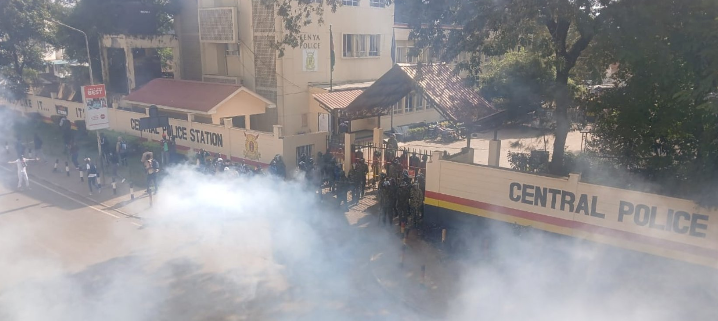Tear Gas and Tension as Kenya Marks Anniversary of Gen Z Protest Movement

Police in Kenya have fired tear gas to disperse thousands of protesters who flooded the streets of Nairobi and other major towns on Wednesday, marking the first anniversary of the deadly 2024 anti-government demonstrations.
Businesses and schools remained shut in parts of the capital as fears of looting and violence gripped the city.
The protests commemorate a dark chapter in the country’s recent history, when a wave of youth-led demonstrations against the Finance Bill turned chaotic, culminating in the storming of Parliament and the deaths of over 60 people.
No one has been held accountable for the killings, a fact that continues to fuel public outrage.
This year’s anniversary march was met with a heavy police presence, despite constitutional guarantees protecting peaceful assembly. Human rights observers reported confrontations in Nairobi, Kisumu, and Mombasa, as security forces moved to break up crowds even before gatherings could coalesce.
Former Chief Justice David Maraga, who is widely seen as a frontrunner in the 2027 presidential race, weighed in with a strongly worded statement from his campaign headquarters, describing the protests as the start of Kenya’s “third liberation.”
“Just like the first liberation from colonial rule and the second from one-party dictatorship, this generation of young people – the Gen Zs – has paid the ultimate sacrifice with their blood,” Maraga declared. “The use of goons and other state-sponsored militia is unlawful and a threat to our national security.”
Maraga warned that the deployment of police and military against peaceful demonstrators violates the Constitution and that the Commander-in-Chief must be held accountable for any such actions. He urged protesters to remain lawful and vigilant, and called on the state to respect the rights of all citizens.
His statement echoed growing concerns from the international community. In a rare joint statement, ambassadors and high commissioners from 12 countries—including the United States, Germany, and the United Kingdom—called for restraint from security forces and full accountability for past abuses.
“The use of plain-clothed officers in unmarked vehicles erodes public trust and was ruled unlawful by the High Court,” the diplomats said.
“We are troubled by the use of hired goons to infiltrate or disrupt peaceful gatherings. Transparency and accountability are critical—not only for justice, but for restoring confidence in the institutions meant to serve and protect.”
The coordinated messages from both a key presidential contender and major diplomatic missions underscore the deepening unease over the state’s response to civic dissent and the broader erosion of democratic norms.
As the sun set on a day marked by tear gas, chants, and defiance, it was clear that the memory of the 2024 protests—and the youth who led them—remains a potent force in Kenya’s political future.



0 Comments